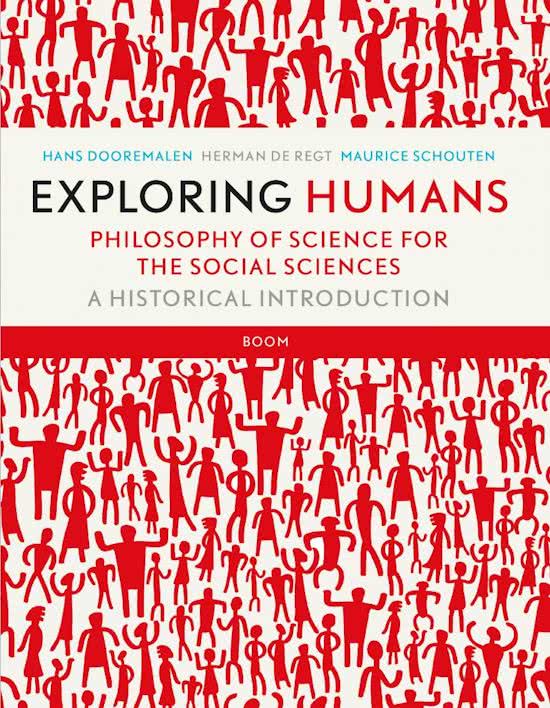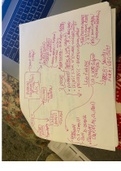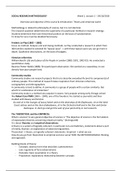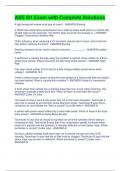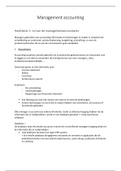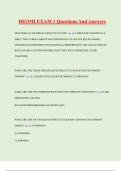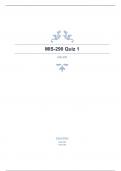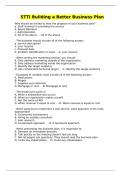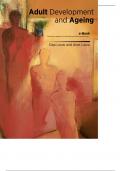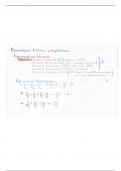EXPLORING HUMANS SUMMARY
7
7.1 - 7.4
- Scientific Revolution + the Enlightenment = no point in appealing to authority for knowledge
- We carry the sources of knowledge in ourselves
- *rationalism = we ultimately gain knowledge from our reasoning capacities
- *empiricism = we depend for knowledge on sensory experiences
- *logical positivist = the source of knowledge is science relying on factual statements
which were due to sensory observations
- KARL POPPER critics of positivism
o Wasn’t a member of the Vienna circle but attended some meetings
o Logik der Forschung – criticism of positivism; published by the Vienna Circle
o Agreed with logical positivists on the importance of math and logic for science
o Theory comes before observation
o *critical rationalist*
o Influenced by Marxism and Alfred Adler
Humans are liable to make mistakes
Humans are fallible creatures
There is a major difference between dogmatic theories and critical thinking
o The bending of light
Newton’s theory – the light of the stars would bend slightly as it passes
alongside an object with enormous mass (like sun)
Einstein – the rays of light would bend more under influence of the
gravitational field of large objects than was predicted by Newtonian physics
Eddington photographed the sky to see who was right Einstein was
This made Pooper doubt the scientific status of theories that were able to
explain every observation
o If we adopt the logical positivists’ criterion of verification, the implication is that
some of the best scientific achievements no longer deserve to be called scientific
Hume = no theory is ever verified
Problem with induction = it cannot be logically justified
The universal laws of nature cannot be verified (*story about the swans)
If we follow the logical positivist, the best of our sciences emerge as
speculative nonsense
Popper = positivism leads to the invasion of metaphysics into the scientific
realm
No universal claim/law can be verified because it is impossible to check
every instance that falls under that law
Schlick = universal laws are neither true or false; they are mere instruments
that can be used to infer statements about particular events
Carnap = verificationism leads to a too narrow restriction of scientific
language excluding both metaphysical and certain scientific sentences that
have factual meanings
It is possible to test statements that follow from a theory of law and check if
the observations support the theory
, The theory must agree with empirically established facts
Verifiability replaced by confirmability
Universal laws find 0 confirmation in a temporally infinite universe – if the
universe was finite their confirmation value borders on 0
o POPPER = neither verifiability or confirmability, but FALSIFIABILITY can separate
science from non-science
If a theory fails to make predictions that might be wrong, it is not a scientific
theory
Falsifiability is the criterion of demarcation (to distinguish scientific from
pseudo-scientific and other non-scientific theories) which says that
something can be classified as science when it is possible to test whether it
is false
Only theories that are falsifiable are informative
7.5. FALSIFICATION
7.5.1 FALSIFIABILITY IS AND ADEQUATE CRITERION OF DEMARCATION
- A statement or theory must be falsifiable in order to be called scientific we must be able
to specify under which conditions the statement or theory would be falsified
- Marx’s theory could be falsified so it was scientific (acc to Popper)
o The problem was that it was both falsifiable and falsified
o Scientists who agree with it didn’t want to accept that it was incorrect so they
changed it
Such attempt to deflect criticism by making changes/adjustments to a
theory is called ‘stratagem’ or ‘conventional twist’ – makes a theory immune
to all falsification (Popper)
Same story with Adler’s psychoanalytic theory (a kid drowning in the river
and a person standing outside – he can either help him or let him drown and
both decisions would be justified because of man’s desire to overcome his
inferiority complex) Popper claimed that this theory can’t be falsified and
is not scientific no matter what is observed, the theory is true
Same thing with Freud’s theory of Oedipus complex (every boy has an
unconscious wish to murder his father and marry his mother and the one
who claims he doesn’t have these urges is simply in denial) it is
unfalsifiable because both scenarios seem possible and both confirm the
theory
- Popper introduces a new term: Corroboration – when a hypothesis survives a certain test, it
is not verified or confirmed, but it is merely corroborated: it has not yet been proven wrong
but will be accepted for the time being
7.5.2. Only theories that can be falsified are informative
- Only theories that can be falsified are informative if falsification is impossible, statements
and theories fail to be informative
- But that doesn’t mean those statements are meaningless
- *logical positivist criterion of demarcation was supposed to separate scientific from non-
scientific statements and meaningful from meaningless statements
, o But Popper’s demarcation criterion only separates scientific from non-scientific
statements a statement can be non-scientific but that doesn’t mean it’s
meaningless
o He argued that even some scientific theories started out as a myth Neo-Darwinist
theory of evolution (meaningful but unscientific myth)
7.5.3. FALLIBILITY
- Humans are fallible creatures
- “we do not know; we can only guess”
- We can never be sure weather our opinions are true
- Our cognitive and perceptual capacities are such that we make mistakes
- The best we can do is to learn from our mistakes
- The negative road to truth – knowledge only advances when a deductivist methodology is
adopted that says we should derive risky predictions from theoretical guesses concerning
the nature of reality the only road to knowledge is to correct our mistakes
7.5.4. KNOWLEDGE GROWS THROUG CONJECTURES AND REFUTATIONS, TRIAL AND ERROR
- In science, induction is needed to generate hypothesis Popper argued that induction is
invalid – science uses a method of deductive reasoning which is logically valid
- Induction = starts with the particular, ends with universal statements
- Deduction = the opposite
o If the premises are true, the conclusion must be true as well
o The problem with deduction is to establish the truth of the 1 st premise/general
statement can’t be done (Popper)
- Popper describes the scientific method as one of conjectures and refutations or trial and
error
o As long as we have not refuted the theory, we can accept it as true
7.6. CRITICAL RATIONALISM
- Popper agreed with Kant that our sensory capacities cooperate with our reasoning capacities
to form a picture of the world
o We only know our world through theories, not as it is in itself
o He agreed that we only see the world in the way our mind imposes us to
- Innate knowledge exists (the example of newborns who have inborn expectation of being
fed and protected) we are born with instinctive theories that allow us to find regularity in
the world but innate theories are not a priori valid knowledge (they are not certain)
- The rational structures that we impose on the world are always tentative and conjectural
and never certain
- Theory precedes and forms observation theories always come first
- Observation is always selective – it needs a chosen object, a definite task, an interest, a point
of view, a problem
o In his observation, a scientist will adopt a point of view that is determined by ‘his
conjectures and anticipations, and the theories which he accepts as a kind of
background’
- Humans go beyond their innate theories – they test their beliefs in reality
7.7 THE RATIONALITY PRINCIPLE IN THE SOCIAL SCIENCES
7
7.1 - 7.4
- Scientific Revolution + the Enlightenment = no point in appealing to authority for knowledge
- We carry the sources of knowledge in ourselves
- *rationalism = we ultimately gain knowledge from our reasoning capacities
- *empiricism = we depend for knowledge on sensory experiences
- *logical positivist = the source of knowledge is science relying on factual statements
which were due to sensory observations
- KARL POPPER critics of positivism
o Wasn’t a member of the Vienna circle but attended some meetings
o Logik der Forschung – criticism of positivism; published by the Vienna Circle
o Agreed with logical positivists on the importance of math and logic for science
o Theory comes before observation
o *critical rationalist*
o Influenced by Marxism and Alfred Adler
Humans are liable to make mistakes
Humans are fallible creatures
There is a major difference between dogmatic theories and critical thinking
o The bending of light
Newton’s theory – the light of the stars would bend slightly as it passes
alongside an object with enormous mass (like sun)
Einstein – the rays of light would bend more under influence of the
gravitational field of large objects than was predicted by Newtonian physics
Eddington photographed the sky to see who was right Einstein was
This made Pooper doubt the scientific status of theories that were able to
explain every observation
o If we adopt the logical positivists’ criterion of verification, the implication is that
some of the best scientific achievements no longer deserve to be called scientific
Hume = no theory is ever verified
Problem with induction = it cannot be logically justified
The universal laws of nature cannot be verified (*story about the swans)
If we follow the logical positivist, the best of our sciences emerge as
speculative nonsense
Popper = positivism leads to the invasion of metaphysics into the scientific
realm
No universal claim/law can be verified because it is impossible to check
every instance that falls under that law
Schlick = universal laws are neither true or false; they are mere instruments
that can be used to infer statements about particular events
Carnap = verificationism leads to a too narrow restriction of scientific
language excluding both metaphysical and certain scientific sentences that
have factual meanings
It is possible to test statements that follow from a theory of law and check if
the observations support the theory
, The theory must agree with empirically established facts
Verifiability replaced by confirmability
Universal laws find 0 confirmation in a temporally infinite universe – if the
universe was finite their confirmation value borders on 0
o POPPER = neither verifiability or confirmability, but FALSIFIABILITY can separate
science from non-science
If a theory fails to make predictions that might be wrong, it is not a scientific
theory
Falsifiability is the criterion of demarcation (to distinguish scientific from
pseudo-scientific and other non-scientific theories) which says that
something can be classified as science when it is possible to test whether it
is false
Only theories that are falsifiable are informative
7.5. FALSIFICATION
7.5.1 FALSIFIABILITY IS AND ADEQUATE CRITERION OF DEMARCATION
- A statement or theory must be falsifiable in order to be called scientific we must be able
to specify under which conditions the statement or theory would be falsified
- Marx’s theory could be falsified so it was scientific (acc to Popper)
o The problem was that it was both falsifiable and falsified
o Scientists who agree with it didn’t want to accept that it was incorrect so they
changed it
Such attempt to deflect criticism by making changes/adjustments to a
theory is called ‘stratagem’ or ‘conventional twist’ – makes a theory immune
to all falsification (Popper)
Same story with Adler’s psychoanalytic theory (a kid drowning in the river
and a person standing outside – he can either help him or let him drown and
both decisions would be justified because of man’s desire to overcome his
inferiority complex) Popper claimed that this theory can’t be falsified and
is not scientific no matter what is observed, the theory is true
Same thing with Freud’s theory of Oedipus complex (every boy has an
unconscious wish to murder his father and marry his mother and the one
who claims he doesn’t have these urges is simply in denial) it is
unfalsifiable because both scenarios seem possible and both confirm the
theory
- Popper introduces a new term: Corroboration – when a hypothesis survives a certain test, it
is not verified or confirmed, but it is merely corroborated: it has not yet been proven wrong
but will be accepted for the time being
7.5.2. Only theories that can be falsified are informative
- Only theories that can be falsified are informative if falsification is impossible, statements
and theories fail to be informative
- But that doesn’t mean those statements are meaningless
- *logical positivist criterion of demarcation was supposed to separate scientific from non-
scientific statements and meaningful from meaningless statements
, o But Popper’s demarcation criterion only separates scientific from non-scientific
statements a statement can be non-scientific but that doesn’t mean it’s
meaningless
o He argued that even some scientific theories started out as a myth Neo-Darwinist
theory of evolution (meaningful but unscientific myth)
7.5.3. FALLIBILITY
- Humans are fallible creatures
- “we do not know; we can only guess”
- We can never be sure weather our opinions are true
- Our cognitive and perceptual capacities are such that we make mistakes
- The best we can do is to learn from our mistakes
- The negative road to truth – knowledge only advances when a deductivist methodology is
adopted that says we should derive risky predictions from theoretical guesses concerning
the nature of reality the only road to knowledge is to correct our mistakes
7.5.4. KNOWLEDGE GROWS THROUG CONJECTURES AND REFUTATIONS, TRIAL AND ERROR
- In science, induction is needed to generate hypothesis Popper argued that induction is
invalid – science uses a method of deductive reasoning which is logically valid
- Induction = starts with the particular, ends with universal statements
- Deduction = the opposite
o If the premises are true, the conclusion must be true as well
o The problem with deduction is to establish the truth of the 1 st premise/general
statement can’t be done (Popper)
- Popper describes the scientific method as one of conjectures and refutations or trial and
error
o As long as we have not refuted the theory, we can accept it as true
7.6. CRITICAL RATIONALISM
- Popper agreed with Kant that our sensory capacities cooperate with our reasoning capacities
to form a picture of the world
o We only know our world through theories, not as it is in itself
o He agreed that we only see the world in the way our mind imposes us to
- Innate knowledge exists (the example of newborns who have inborn expectation of being
fed and protected) we are born with instinctive theories that allow us to find regularity in
the world but innate theories are not a priori valid knowledge (they are not certain)
- The rational structures that we impose on the world are always tentative and conjectural
and never certain
- Theory precedes and forms observation theories always come first
- Observation is always selective – it needs a chosen object, a definite task, an interest, a point
of view, a problem
o In his observation, a scientist will adopt a point of view that is determined by ‘his
conjectures and anticipations, and the theories which he accepts as a kind of
background’
- Humans go beyond their innate theories – they test their beliefs in reality
7.7 THE RATIONALITY PRINCIPLE IN THE SOCIAL SCIENCES

